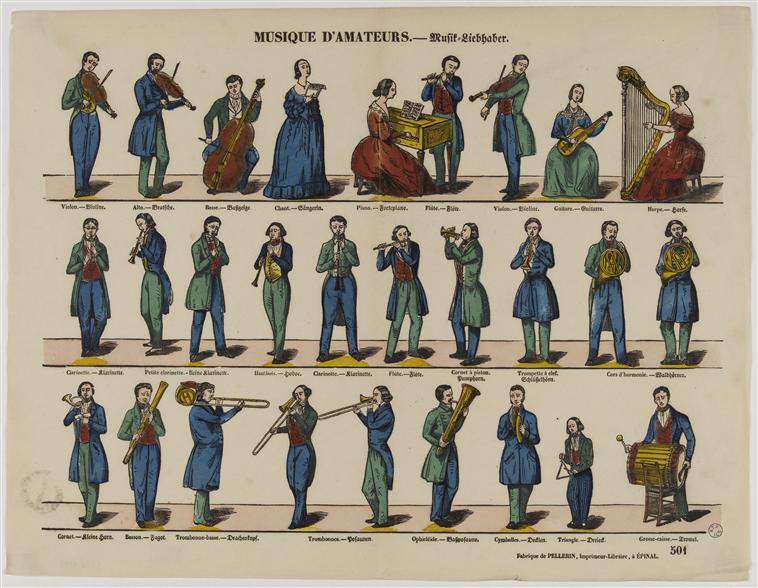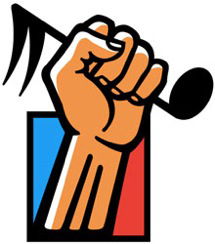
How can anyone profess to know what’s best for musicians when there is total disagreement as to what a musician is?
In conversation after conversation, I have come to the following conclusion: the fundamental disagreement in the copyright vs. free culture debate is over opposing definitions of “musician”.
In one corner, we have the musician as defined by the copyright industry. This is the definition with the most qualifiers. To be a musician in their eyes, you must be making a living playing music, or at least actively pursing a music career. There is an aesthetic judgement too — the “quality” of the music must demonstrate a level of competency above the amateur. This is a subjective assessment, but factors include fidelity of recording, originality in composition, and technical acuity in performance.
In the other corner, we have free culture advocate. The underdog. Their definition of musician has virtually no qualifiers — one must only be composing, performing or recording actively to be considered a musician. Quality, skill, experience… these are not necessary for musicianship. One need only play.
Much can be said about these two opposing philosophies, but I am going to stick to how these attitudes relate to the constitutional purpose of copyright, to “Promote the Progress of Science and Useful Arts”.
There has been much debate over what “Progress” means in this clause. One can imagine our two fighting definitions as revealing different interpretations. The copyright industry would likely consider “Progress” to be any work of art that has demonstrated market value. They would see the inclusion of “Progress” as intent to separate amateurs from professionals in economic terms.
A world full of amateurs would not fulfill the copyright charter for these folks. It doesn’t matter what “Arts” progress if none of them are “Progress”. “Progress” for them is the conversion of the amateur musician to the professional musician. This view is driven by economic imperatives, and it comes as no surprise those musicians and businesses that have profited the most from copyright are its most vehement supporters. This view is more in line with the “labor / desert” theories of copyright which justify granting market monopolies as a way to make available the “just deserts” of creators’ labor as a critical incentive to create.
The free culture advocate is quick to point out the hypocrisy in the above view. “Progress” doesn’t emerge out of thin air. Everyone starts as an amateur. There could be no music professionals without a thriving amateur musician scene. How soon the professional forgets they were once the amateur. “Progress” for them is represented by the conversion of the non-musician to the amateur musician. This view is largely driven by creative or cultural imperatives.
It also is demonstrably true that a musician who defines “Progress” from an economic standpoint will often end up working in the music industry instead of being a musician. There simply isn’t much money to be made being a musician, and what profit exists is fiercely competed over, dependent on impeccable timing bordering on luck, and rarely lasts.
On the other hand, most musicians hold the view that defines “Progress” in creative and cultural terms. This is great for culture, but bad for musicians making money. It explains why musicians have historically been bad earners. It also helps explain the system of exploitation the entire record business is based on.
So, the music industry overwhelmingly defines musicians as those who are contributing measurable value to the music economy. Musicians define themselves as creatives making cultural contributions, which may subsequently be recognized financially. What about fans?
I would suggest most fans’ attitudes of what defines a musician fall somewhere between the opposing poles. Which side they gravitate to depends on their musical tastes. Those who enjoy discovering obscure acts and new artists probably hold more of a cultural view, while those with more mainstream pop tastes might have a narrower view of what constitutes a musician. The former celebrate the value in music that isn’t necessarily economically viable, the latter celebrate the value in music produced by big budgets and big business.
In other words, all approaches are variably valid in the eyes of the public, and this is the group copyright is meant to protect. Certainly, copyright is a tool for creators, but its charter is to benefit the greater good. The needs of the musician and the music business are intertwined, but ultimately the needs of the commons take precedence in concerns over copyright’s purpose.

The best and most recent attempt to answer the vexing “How many musicians are there?” question was undertaken by the Future of Music Coalition (FMC).
The conclusion? “There is no reliable way to measure the real size of the US musician population.”
Leaves a little something to be desired, doesn’t it? The FMC highlights three key reasons for their assessment:
“(1) There is no agreed-upon definition for “musician”, no certifications or qualifying tests; (2) There is no one organization that represents all musicians; (3) The government’s statistics excludes a huge chunk of the musician population by their own counting standards.”
It’s not likely we’ll have a single organization that represents musicians anytime soon because amateur musicians by definition aren’t professionally represented. Nor will the government be able to shed any light on the uncounted musical masses huddled at the edges of the music career world.
The only way we’ll be able to reform music copyright to be equitable to all is to agree upon the definition of “musician”. I would be remiss to leave the issue hanging here unresolved, so here’s my proposition for how we can move forward in this endeavor:
There is a concept in copyright law called “extralegal norms”. Sometimes traditions and standard methods of operation achieve the “Progress” goals of copyright without having to involve messy and expensive legal procedures. In this respect, under utilitarian theories, copyright is justly viewed as a “necessary evil” that can be rendered unnecessary if the culture of creation provides enough incentive and protection to creators already.
For example, comedians are not granted copyright in part because of extralegal norms that involve the self-policing public shaming of joke-stealers (Joe Rogan vs Carlos Mencia being the classic example). Like fashion, which is similarly unprotected by copyright, comedy is often defined by its context — a moment in time that is fleeting. As such, fashion and comedy are thought by many to be better off without a copyright system that might stifle that rapid innovation required to stay “of the moment”.
This unprotected creativity is starting to sound a lot like music. I think it’s time to take a serious look at the parallel extralegal norms in music and consider that in many respects musicians may not need copyright protection at all. Among them:
(1) Cost of production is becoming so low, musicians no longer have to give up their master rights just to have an album made. The less musicians choose to be exploited this way, the less copyright protection they need.
(2) Songs were meant to be shared. Online, copyright is increasingly unenforceable. An unenforceable law does no good, and when it is enforced, it limits sharing — which is in many ways the purpose of the song’s creation in the first place.
(3) As the language of emotion, music creation is primarily driven by a deep-seated need to express oneself. Most musicians make music for the love of doing so, not for the money. As such, copyright less necessary to provide an incentive for the labor of music creation.
(4) Music increasingly involves collective authorship. In many ways the “amateurization” of music is bringing us back to music’s folk roots. The folk tradition does not require copyright incentives for it is an expressive practice where sole authorship is downplayed in favor of collective, historic tradition. Joint authorship copyright has historically been avoided as a creativity-stifling minefield of competing conflicts of interest.
(5) There are self-policing features in music to prevent outright stealing of material. I would look to the fan outrage over the appropriation of the “seapunk” micro-genre by Rhianna as a parallel example to Mencia vs. Rogan. Such co-option is becoming less of an economic threat because the web connects fans in a way that amplifies their collective attitudes. Witness how fast Seapunk was dropped by those in the mainstream who were caught with their hands in the cookie jar attempting to co-opt it.
There are many more reasons why copyright might also stifle creativity and music in general — they can be found throughout my blog. Here I tried to stick to the extralegal norms that warrant it unnecessary or at least in dire need of reform.
The critical and final point I want to make is that all of the above strongly suggests to me we need a broader definition of “musician”. While I find truth on both sides, I can’t find a single good reason why we should narrow our view of what constitutes a musician.
We should openly embrace the “amateurization” of music and build a music economy and culture in which the millions of aspiring professionals get a fair shot at making a buck by being discovered and supported by their prospective fans.
How do you define “musician”? Is it time to change our collective attitudes and widen the circle?
